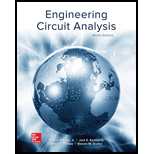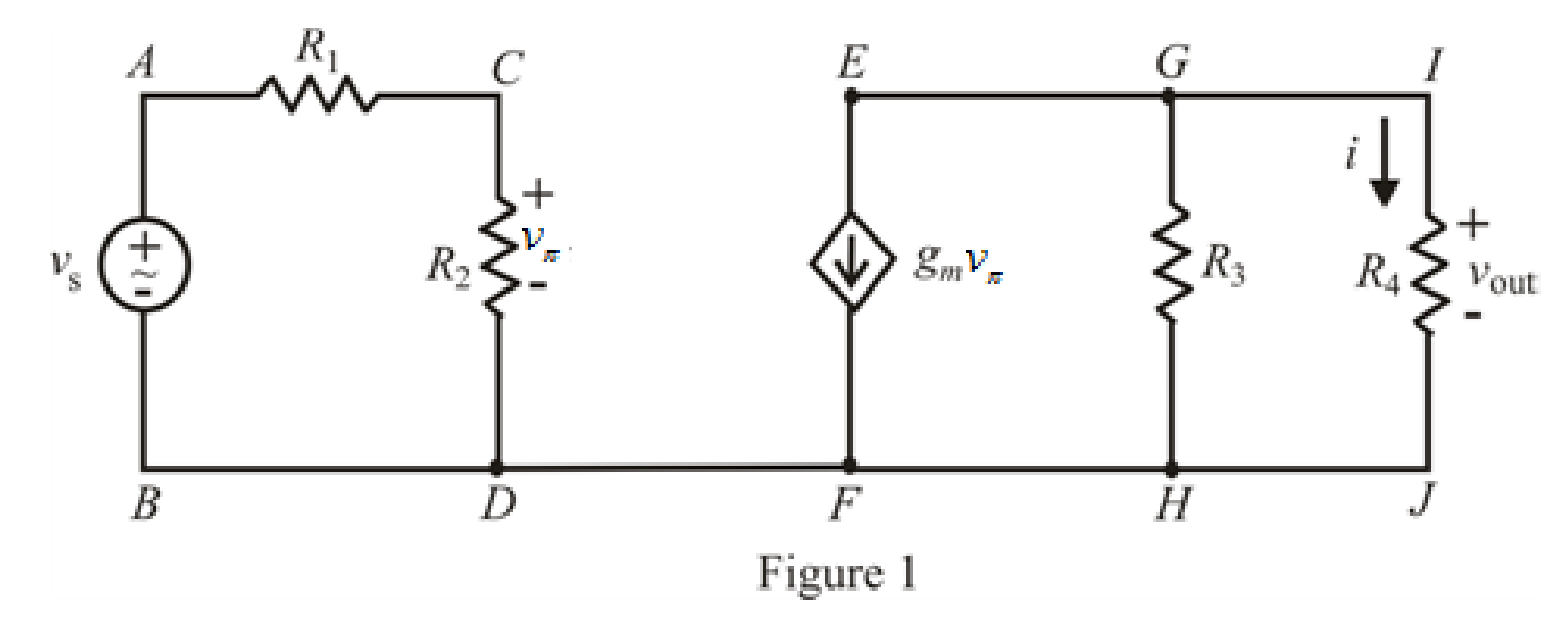
Concept explainers
(a)
Find current through
(a)
Answer to Problem 59E
The current through
Explanation of Solution
Given data:
Value of trans-conductance
Value of voltage supply
Calculation:
The redrawn circuit is shown in Figure 1.

Refer to the Figure 1.
The expression for voltage division across resistance
Here,
The expression for current division rule across resistance
Here,
Substitute
Solve for
Substitute
Solve for
Conclusion:
Thus, the current across the
(b)
Find the amplifier output voltage
(b)
Answer to Problem 59E
The amplifier output voltage
Explanation of Solution
Calculation:
Refer to the Figure 1.
The expression for ohm’s law across resistance
Here,
Refer to the Figure 1.
Substitute
Conclusion:
Thus, the amplifier output voltage in the circuit is
(c)
Check whether the circuit can amplify the signal.
(c)
Answer to Problem 59E
The amplified output voltage can’t amplify the input signal because
Explanation of Solution
Refer to Figure 1
The amplified output voltage
For the amplification, the desired condition must satisfy which is
Conclusion:
Thus, the amplified output voltage can’t amplify the input signal because
(d)
Check whether the circuit can amplify the signal for input voltage
(d)
Answer to Problem 59E
The circuit can amplify the input signal because it satisfies the condition
Explanation of Solution
Refer to Figure 1
The amplified output voltage
For the amplification, the desired condition must satisfy which is
Conclusion:
Thus, circuit can amplify the input signal because it satisfies the condition
Want to see more full solutions like this?
Chapter 3 Solutions
Loose Leaf for Engineering Circuit Analysis Format: Loose-leaf
- The line diagram is of a standard forward/reverse/stop pushbutton station for forwarding and reversing a motor. Included in the circuit are mechanical and auxiliary contact interlocking. Also included are a forward overtravel limit switch to stop the motor in forward and a reverse overtravel limit switch to stop the motor in reverse. Overload protection is common to both forward and reverse directions. Complete the wiring diagram based on the line diagram. Do not make any wire splices or additional terminal connections on the wiring diagram (notice how they make multiple connections in the power circuit). All connections must run from terminal screw to terminal screw complete the wiring diagram based on the line diagram. Do not make any wires splices or additional terminal connections on the wiring diagram. All connections must run from terminal screw to terminal screwarrow_forward6.7 Consider a baseband binary PAM system that transmits at 3600 bps with a bit error rate less than 10-4. The channel introduces no distortion, but attenuates the signal by 20 dB and has a bandwidth of 2.4 kHz. The channel noise is AWGN with a power spectral density of 10-14 watts per Hertz (W/Hz). Design the optimum transmitting and receiving filters, and determine the required transmit power.arrow_forward6.10 In a baseband digital transmission, the bandwidth is 4 kHz, and the bit rate must be at least 38.4 kbps. Assuming M-ary signaling, determine the range of acceptable values of M, and the resulting bit error rate.arrow_forward
- Assume a JFET device with VGS(0) = -1.3 and ipss = 20 mA. Design a self-biased (Fig. 2) JFET common-source amplifier with the gain of -2 and a DC biasing that allows the largest swing in ip. Note that you can choose Vcc to arrive at a desired RD to meet the gain requirement. Since you are designing for a given gain, you may have to check to see if JFET is biased correctly. (Hint: First find Rs for correct VGs and then use the gain to compute RD. Finally, use RD and Rs to determine Vec). Assume that the amplifier is to interface a source that expects a load of 50 2. Also, assume that the amplifier circuit is AC coupled at both ends with 3 dB corner frequency of 15 kHz.arrow_forwardEXAMPLE 6.7 Consider an M-ary system with the number of symbols M=16, and the roll-off factor a= Discuss this M-ary system, vis-à-vis the corresponding binary system, for various scenarios. Solution 1arrow_forwardDesign an oscillator circuit using the arrangement in Fig. 4 (namely, find C+1=C+2). Fig. 4 shows that we are using a pair of 2N5485 JFET. However, you are supplied with two J112 (or J113) to be used here. Use datasheet for J112 (or J113) to determine the needed capacitances. The oscillation frequency is considered to be 1 MHz. Use L₁ = L₂ = 112 μH. Furthermore, assume Cr=200 pF and Re = 300 . Is the assumption Cf >> CGS&CGD valid?arrow_forward
- 10pts: Matlab: From Problem 1 of homework 6, repeated below: Generate a random binary PAM transmit signal of -1 and + 1 volts of length 100. Simulate the transmit signal being sent over a channel with AWGN with an Eb/No of 3 dB. Plot the received signal constellation using a red o to represent when a logical 0 was sent and a blue * to represent a logical 1 was sent Question (1) Increase the Eb/No to 7 dB. Approximately what length of the signal do you need to get consistently within ~5% of the theoretical value for the bit error rate? a) Guess without doing any simulations b) Estimate by trial and observing the results.arrow_forward(1) A baseband PAM communication channel bandwidth is 100 KHz and has a noise power spectral density of 10^-9 W/Hz. The channel loss between the transmitter and receiver is 25dB. The application requires a bit rate of 500 Kbps and BER of less than 10^-5. The system uses raised cosine pulses with a roll-off factor of 0.25. Determine the minimum transmit power required. (2) Continuing problem 1. Everything for the previous problem stays the same BUT the best Power Amplifier you can afford has a maximum output power of 10 Watts. What will be estimated BER for the system?arrow_forwardExplain magnetic hysteresis and give examples of some calculationsarrow_forward
- EXAMPLE 6.8 Suppose the samples of the nonideal received pulse are as follows: 0. m1 Design a three-tap ZF equalizer.arrow_forwardAssume a JFET device with VGS(0) = -1.3 and ipss = 20 mA. Design a self-biased (Fig. 2) JFET common-source amplifier with the gain of -2 and a DC biasing that allows the largest swing in ip. Note that you can choose Vcc to arrive at a desired RD to meet the gain requirement. Since you are designing for a given gain, you may have to check to see if JFET is biased correctly. (Hint: First find Rs for correct VGs and then use the gain to compute RD. Finally, use RD and Rs to determine Vcc). Assume that the amplifier is to interface a source that expects a load of 50 . Also, assume that the amplifier circuit is AC coupled at both ends with 3 dB corner frequency of 15 kHz. Rearrange the circuit in step 1 to implement a common-drain amplifier. Do note that the output capacitor (C2) must be redesigned as the output impedance of common-drain is different from that of common-source amplifier. What is the actual gain? What is the input impedance?arrow_forwardAssume a JFET device with VGS(0) = -1.3 and ipss = 20 mA. Design a self-biased (Fig. 2) JFET common-source amplifier with the gain of -2 and a DC biasing that allows the largest swing in ip. Note that you can choose Vcc to arrive at a desired RD to meet the gain requirement. Since you are designing for a given gain, you may have to check to see if JFET is biased correctly. (Hint: First find Rs for correct VGs and then use the gain to compute RD. Finally, use RD and Rs to determine Vec). Assume that the amplifier is to interface a source that expects a load of 50 2. Also, assume that the amplifier circuit is AC coupled at both ends with 3 dB corner frequency of 15 kHz.arrow_forward
 Introductory Circuit Analysis (13th Edition)Electrical EngineeringISBN:9780133923605Author:Robert L. BoylestadPublisher:PEARSON
Introductory Circuit Analysis (13th Edition)Electrical EngineeringISBN:9780133923605Author:Robert L. BoylestadPublisher:PEARSON Delmar's Standard Textbook Of ElectricityElectrical EngineeringISBN:9781337900348Author:Stephen L. HermanPublisher:Cengage Learning
Delmar's Standard Textbook Of ElectricityElectrical EngineeringISBN:9781337900348Author:Stephen L. HermanPublisher:Cengage Learning Programmable Logic ControllersElectrical EngineeringISBN:9780073373843Author:Frank D. PetruzellaPublisher:McGraw-Hill Education
Programmable Logic ControllersElectrical EngineeringISBN:9780073373843Author:Frank D. PetruzellaPublisher:McGraw-Hill Education Fundamentals of Electric CircuitsElectrical EngineeringISBN:9780078028229Author:Charles K Alexander, Matthew SadikuPublisher:McGraw-Hill Education
Fundamentals of Electric CircuitsElectrical EngineeringISBN:9780078028229Author:Charles K Alexander, Matthew SadikuPublisher:McGraw-Hill Education Electric Circuits. (11th Edition)Electrical EngineeringISBN:9780134746968Author:James W. Nilsson, Susan RiedelPublisher:PEARSON
Electric Circuits. (11th Edition)Electrical EngineeringISBN:9780134746968Author:James W. Nilsson, Susan RiedelPublisher:PEARSON Engineering ElectromagneticsElectrical EngineeringISBN:9780078028151Author:Hayt, William H. (william Hart), Jr, BUCK, John A.Publisher:Mcgraw-hill Education,
Engineering ElectromagneticsElectrical EngineeringISBN:9780078028151Author:Hayt, William H. (william Hart), Jr, BUCK, John A.Publisher:Mcgraw-hill Education,





